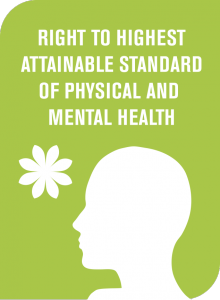
What it means
- African Charter on Human and Peoples Rights (Article 16): Every individual shall have the right to enjoy the best attainable state of physical and mental health. State Parties to the present Charter shall take the necessary measures to protect the health of their people and to ensure that they receive medical attention when they are sick.
- ASEAN Human Rights Declaration: Every person has the right to the enjoyment of the highest attainable standard of physical, mental and reproductive health, to basic and affordable health-care services, and to have access to medical facilities. The ASEAN Member States shall create a positive environment in overcoming stigma, silence, denial and discrimination in the prevention, treatment, care and support of people suffering from communicable diseases, including HIV/AIDS.
- Arab Charter on Human Rights (Article 38): Every person has the right to an adequate standard of living for himself and his family, which ensures their well-being and a decent life, including food, clothing, housing, services and the right to a healthy environment. The States parties shall take the necessary measures commensurate with their resources to guarantee these rights.
(See also General Comment No. 14, Committee on Economic, Social and Cultural Rights)
How it relates to violence against women
It is common to only think about violence against women in physical terms; however, in reality it impacts all aspects women’s health and wellbeing. Studies have now demonstrated the short- and long-term impacts VAW has on women’s physical and mental health, in many cases mirroring the symptoms in torture survivors. The World Health Organization has called VAW a “global health problem of epidemic proportions”. According to its research, VAW increases the likelihood and actual experience of:
- Death and injury
- Depression
- Alcohol use problems
- Sexually transmitted infections
- Unwanted pregnancy and abortion
- Low birth-weight babies
In order for women to be secure in this right at a level equal to their male peers, states must holistically address VAW. As survivors of violence are most likely to consult a medical professional about their experiences, rather than make a report to police, it is extremely important that medical professionals know when patients’ presentation indicates that they have been subjected to VAW, so that medical professionals can ask the right questions and provide the right treatment. This requires gender competence training for health workers and the establishment of standard operating procedures for VAW. It also includes investing in preventative care and mental health services for survivors, among other types of care. It is particularly important for medical professionals to provide sexual and reproductive health services to survivors of rape, particularly emergency contraception and prophylaxis to avoid sexually transmitted infections, including HIV. Where a rape results in pregnancy, survivors should have access to safe and legal abortion services.
Examples of violence against women that violate this right include:
- Denying women reproductive health services
- Female genital mutilation
- Intimate partner violence
![]() Want more? See “Responding to intimate partner violence and sexual violence against women. WHO clinical and policy guidelines” (Geneva: World Health Organization, 2013)
Want more? See “Responding to intimate partner violence and sexual violence against women. WHO clinical and policy guidelines” (Geneva: World Health Organization, 2013)
Click on the cases to the right (or, for mobile users, at the bottom of this page) to learn more about the right to the highest attainable standard of physical and mental health and violence against women.
Icon Key




